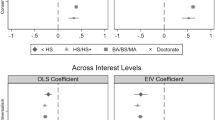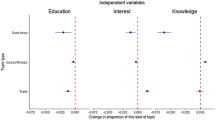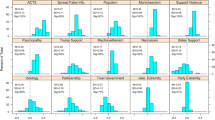Abstract
In this paper a direct comparison is made between the cognitive content of ideological and partisan belief systems. A quasi-experimental design was used in a two-part study. Subjects were randomly assigned to either a partisan or ideological condition and asked to categorize and then scale contemporary leaders, groups, and issues as either Democrat or Republican, liberal or conservative. Results indicate that the meanings of partisan and ideological belief systems are quite similar — their cognitive attributes (issues, groups, and leaders) are interchangeable at the categorical level and highly correlated (r=0.86) in their degree of typicality. Political sophistication is determined to contribute significantly to the degree to which partisan and ideological belief systems are related. For politically sophisticated subjects (Ss) the two belief systems are highly related (r=0.90), whereas for low sophisticates, the belief systems are only moderately related (r=0.50). Sophistication also plays an important role in structuring Ss' own issue preferences. High sophisticates in both the liberal-conservative and Democratic-Republican conditions exhibit a greater level of issue constraint, which can be interpreted as either ideological or partisan constraint.
Similar content being viewed by others
References
Abelson, R. P. (1976). Script processing in attitude formation and decision-making. In J. S. Carroll and J. W. Payne (eds.),Cognition and Social Behavior. Hillsdale, N.J.: Lawrence Erlbaum.
Anderson, J. R., and Bower, G. H. (1973).Human Associative Memory. Washington: V. H. Winston.
Barton, A. H., and Parsons, R. W. (1977). Measuring belief system structure.Public Opinion Quarterly 41:159–180.
Bastedo, R., and Lodge, M. (1980). The meaning of party labels.Political Behavior 2:287–308.
Bobrow, D. G., and Norman, D. A. (1975). Some principles of memory schemata. In D. G. Bobrow and A. Collins (eds.),Representation and Understanding: Studies in Cognitive Science. New York: Academic Press.
Campbell, A., Converse, P. E., Miller, W. E., and Stokes, D. E. (1960).The American Voter. New York: Wiley.
Cofer, C. N., (ed.) (1976).The Structure of Human Memory. San Francisco: W. H. Freeman.
Collins, A. M., and Quillian, M. R. (1969). Retrieval time from semantic memory.Journal of Verbal Learning and Verbal Behavior 8:240–247.
Converse, P. E. (1964). The nature of belief systems in mass publics. In David Apter (ed.),Ideology and Discontent. New York: Free Press.
Converse, P. E. (1980). Comment: Rejoinder to Judd and Milburn.American Sociological Review 45:664–666.
Fiske, S. T., and Taylor, S. E. (1984).Social Cognition. New York: Addison-Wesley.
Hamill, R., Lodge, M., and Blake, F. (1985). The breadth, depth and utility of political belief systems.American Journal of Political Science, forthcoming.
Kinder, D. R. (1982). Enough already about ideology: The many bases of American public opinion. Paper presented at the 1982 annual meeting of the American Political Science Association, Denver.
Kintsch, W. (1974).The Representation of Meaning in Memory. New York: John Wiley & Sons.
Lasswell, H. (1958).Who Gets What, When, How. Cleveland, Ohio: The World Publishing Company.
Levitan, T. E., and Miller, W. (1979). Ideological interpretations of presidential elections.American Political Science Review 73: 751–771.
Lodge, M. (1981).Magnitude Scaling: Quantitative Measurement of Opinions, Vol. 25. Beverly Hills, Calif.: Sage Publications.
Loftus, G., and Loftus, E. (1976).Human Memory: The Processing of Information, Hillsdale, N.J.: Lawrence Erlbaum Associates.
Mischel, W., Ebbesen, E. B., and Zeiss, A. M. (1976). Determinants of selective memory about the self.Journal of Consulting and Clinical Psychology 44:92–103.
Nie, N., Verba, S., and Petrocik, J. (1976).The Changing American Voter. Cambridge, Mass.: Harvard University Press.
Norman, D. A., and Bobrow, D. G. (1975). On the role of active memory processes in perception and cognition. In Cofer (ed.),The Structure of Human Memory.
Norpoth, H., and Lodge, M. (1985). Political sophistication and the nature of attitude responses.American Journal of Political Science 29(2): 109–123.
Rips, L. J., Shoben, E. J., and Smith, E. E. (1973). Semantic distance and the verification of semantic relations.Journal of Verbal Learning and Verbal Behavior 12:1–20.
Rosch, E. (1975). Cognitive representations of semantic categories.Journal of Experimental Psychology: General 104:192–233.
Schank, R., and Abelson, R. (1979).Scripts, Plans, Goals and Understanding: An Inquiry into Human Knowledge Structures. Hillsdale, N.J.: Lawrence Erlbaum.
Stimson, J. A. (1975). Belief systems: Constraint, complexity, and the 1972 election.American Journal of Political Science 19:393–417.
Tanenhaus, J., and Foley, M. A. (1979). The words of things entangle and confuse: response effects and the ambiguous concept. Report, Laboratory of Behavioral Research, SUNY, Stony Brook.
Tulving, E., and Donaldson, W. (eds.) (1976).Organization of Memory. New York: Academic Press.
Wyckoff, M. (1980). Belief system constraint and policy voting: A test of the unidimensional consistency model.Political Behavior 2: 115–146.
Author information
Authors and Affiliations
Additional information
Paper delivered at the Annual Meeting of the American Political Science Association, September 1983.
Rights and permissions
About this article
Cite this article
Sharp, C., Lodge, M. Partisan and ideological belief systems: Do they differ?. Polit Behav 7, 147–166 (1985). https://doi.org/10.1007/BF00988796
Issue Date:
DOI: https://doi.org/10.1007/BF00988796




